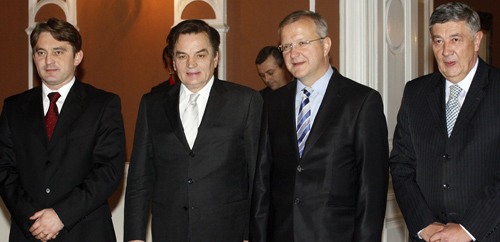Bosnia to sign first EU pact
European enlargement chief says Bosnia set to sign first admission accord.

“The sooner, the better,” he said.
Bosnia was the only country in the Balkans without any formal links to the EU bloc.
Rehn’s decision rewards a last-minute agreement to reform, and eventually unify, the country’s ethnically divided police forces.
‘Essential’ plan
The Bosnian government agreed the merger plan after years of disagreement over an issue that the EU said was essential before it agreed to closer ties.
The peace agreement that ended three-and-a-half-years of war in 1995 divided the country into a Serb Republic and a Bosniak-Croat Federation and each have their own police force.
Merger reforms were blocked by lingering mistrust between the two regions, set up at the end of the brutal 1992-95 war. Bosnian Serbs especially opposed it as an erosion of their autonomy.
 |
| Olli Rehn said the formal signing of the accord would only follow necessary reforms [AFP] |
Since 1995, almost all the ethnically divided structures of government have been merged, including the army, in which Serbs, Muslim Bosnians and Croats serve together, but not the police forces.
The police reform deal was finally secured when Miroslav Lajcak, Bosnia’s powerful international administrator and Slovak diplomat, proposed wide-ranging reforms to voting practices.
The changes would have meant an end to tactics blocking legislation frequently adopted by Bosnian Serbs.
Lajcak said he would impose the change on December 1 if politicians failed to introduce it themselves and faced with an ultimatum, the two sides agreed a watered-down compromise over both voting and police reforms.
Mistrust
The measure had for years been the main pre-condition of the EU for Bosnia to sign the SAA, the first step to membership.
Based on the preliminary political deal on police reform, Bosnia’s central cabinet is now supposed to draft a plan to set up police bodies at the state level, as Brussels wants.
The initialling of the SAA comes after a month of tension and increasingly inflammatory rhetoric.
Nikola Spiric, an ethnic Serb, resigned as prime minister on November 1, accusing Lajcak of threatening Bosnian Serb autonomy by pushing for a voting system that could mean they are outvoted by the other ethnic groups.
Lajcak said he only meant to speed up reforms – often blocked by parties boycotting parliament sessions.
Despite threats to completely walk out of government, the Bosnian Serbs accepted Lajcak’s proposals without explanation on Friday and moved quickly onto discussions on police reform.
The Bosnian presidency has a chair that rotates every eight months, and according to the country’s constitution, the presidency consists of three members – currently, Nebojsa Radmanovic (Serb; chairman) elected from the Republica Srpska, and Zeljko Komsic (Croat), and Haris Silajdzic (Bosniac), both from the Federation.
 |
| Bosnian tripartite: Komsic, left, Silajdzic, second left, and Radmanovic, far right [AFP] |